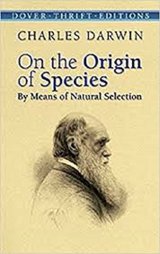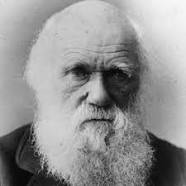On the Origin of Species By Means of Natural Selection Page #11
On the Origin of Species, published on 24 November 1859, is a work of scientific literature by Charles Darwin which is considered to be the foundation of evolutionary biology. Darwin's book introduced the scientific theory that populations evolve over the course of generations through a process of natural selection.
Nor let it be thought that some great deviation of structure would be necessary to catch the fancier's eye: he perceives extremely small differences, and it is in human nature to value any novelty, however slight, in one's own possession. Nor must the value which would formerly be set on any slight differences in the individuals of the same species, be judged of by the value which would now be set on them, after several breeds have once fairly been established. Many slight differences might, and indeed do now, arise amongst pigeons, which are rejected as faults or deviations from the standard of perfection of each breed. The common goose has not given rise to any marked varieties; hence the Thoulouse and the common breed, which differ only in colour, that most fleeting of characters, have lately been exhibited as distinct at our poultry-shows. I think these views further explain what has sometimes been noticed--namely that we know nothing about the origin or history of any of our domestic breeds. But, in fact, a breed, like a dialect of a language, can hardly be said to have had a definite origin. A man preserves and breeds from an individual with some slight deviation of structure, or takes more care than usual in matching his best animals and thus improves them, and the improved individuals slowly spread in the immediate neighbourhood. But as yet they will hardly have a distinct name, and from being only slightly valued, their history will be disregarded. When further improved by the same slow and gradual process, they will spread more widely, and will get recognised as something distinct and valuable, and will then probably first receive a provincial name. In semi-civilised countries, with little free communication, the spreading and knowledge of any new sub-breed will be a slow process. As soon as the points of value of the new sub-breed are once fully acknowledged, the principle, as I have called it, of unconscious selection will always tend,--perhaps more at one period than at another, as the breed rises or falls in fashion,--perhaps more in one district than in another, according to the state of civilisation of the inhabitants--slowly to add to the characteristic features of the breed, whatever they may be. But the chance will be infinitely small of any record having been preserved of such slow, varying, and insensible changes. I must now say a few words on the circumstances, favourable, or the reverse, to man's power of selection. A high degree of variability is obviously favourable, as freely giving the materials for selection to work on; not that mere individual differences are not amply sufficient, with extreme care, to allow of the accumulation of a large amount of modification in almost any desired direction. But as variations manifestly useful or pleasing to man appear only occasionally, the chance of their appearance will be much increased by a large number of individuals being kept; and hence this comes to be of the highest importance to success. On this principle Marshall has remarked, with respect to the sheep of parts of Yorkshire, that "as they generally belong to poor people, and are mostly IN SMALL LOTS, they never can be improved." On the other hand, nurserymen, from raising large stocks of the same plants, are generally far more successful than amateurs in getting new and valuable varieties. The keeping of a large number of individuals of a species in any country requires that the species should be placed under favourable conditions of life, so as to breed freely in that country. When the individuals of any species are scanty, all the individuals, whatever their quality may be, will generally be allowed to breed, and this will effectually prevent selection. But probably the most important point of all, is, that the animal or plant should be so highly useful to man, or so much valued by him, that the closest attention should be paid to even the slightest deviation in the qualities or structure of each individual. Unless such attention be paid nothing can be effected. I have seen it gravely remarked, that it was most fortunate that the strawberry began to vary just when gardeners began to attend closely to this plant. No doubt the strawberry had always varied since it was cultivated, but the slight varieties had been neglected. As soon, however, as gardeners picked out individual plants with slightly larger, earlier, or better fruit, and raised seedlings from them, and again picked out the best seedlings and bred from them, then, there appeared (aided by some crossing with distinct species) those many admirable varieties of the strawberry which have been raised during the last thirty or forty years. In the case of animals with separate sexes, facility in preventing crosses is an important element of success in the formation of new races,--at least, in a country which is already stocked with other races. In this respect enclosure of the land plays a part. Wandering savages or the inhabitants of open plains rarely possess more than one breed of the same species. Pigeons can be mated for life, and this is a great convenience to the fancier, for thus many races may be kept true, though mingled in the same aviary; and this circumstance must have largely favoured the improvement and formation of new breeds. Pigeons, I may add, can be propagated in great numbers and at a very quick rate, and inferior birds may be freely rejected, as when killed they serve for food. On the other hand, cats, from their nocturnal rambling habits, cannot be matched, and, although so much valued by women and children, we hardly ever see a distinct breed kept up; such breeds as we do sometimes see are almost always imported from some other country, often from islands. Although I do not doubt that some domestic animals vary less than others, yet the rarity or absence of distinct breeds of the cat, the donkey, peacock, goose, etc., may be attributed in main part to selection not having been brought into play: in cats, from the difficulty in pairing them; in donkeys, from only a few being kept by poor people, and little attention paid to their breeding; in peacocks, from not being very easily reared and a large stock not kept; in geese, from being valuable only for two purposes, food and feathers, and more especially from no pleasure having been felt in the display of distinct breeds.
Translation
Translate and read this book in other languages:
Select another language:
- - Select -
- 简体中文 (Chinese - Simplified)
- 繁體中文 (Chinese - Traditional)
- Español (Spanish)
- Esperanto (Esperanto)
- 日本語 (Japanese)
- Português (Portuguese)
- Deutsch (German)
- العربية (Arabic)
- Français (French)
- Русский (Russian)
- ಕನ್ನಡ (Kannada)
- 한국어 (Korean)
- עברית (Hebrew)
- Gaeilge (Irish)
- Українська (Ukrainian)
- اردو (Urdu)
- Magyar (Hungarian)
- मानक हिन्दी (Hindi)
- Indonesia (Indonesian)
- Italiano (Italian)
- தமிழ் (Tamil)
- Türkçe (Turkish)
- తెలుగు (Telugu)
- ภาษาไทย (Thai)
- Tiếng Việt (Vietnamese)
- Čeština (Czech)
- Polski (Polish)
- Bahasa Indonesia (Indonesian)
- Românește (Romanian)
- Nederlands (Dutch)
- Ελληνικά (Greek)
- Latinum (Latin)
- Svenska (Swedish)
- Dansk (Danish)
- Suomi (Finnish)
- فارسی (Persian)
- ייִדיש (Yiddish)
- հայերեն (Armenian)
- Norsk (Norwegian)
- English (English)
Citation
Use the citation below to add this book to your bibliography:
Style:MLAChicagoAPA
"On the Origin of Species By Means of Natural Selection Books." Literature.com. STANDS4 LLC, 2025. Web. 10 Jan. 2025. <https://www.literature.com/book/on_the_origin_of_species_by_means_of_natural_selection_323>.




Discuss this On the Origin of Species By Means of Natural Selection book with the community:
Report Comment
We're doing our best to make sure our content is useful, accurate and safe.
If by any chance you spot an inappropriate comment while navigating through our website please use this form to let us know, and we'll take care of it shortly.
Attachment
You need to be logged in to favorite.
Log In